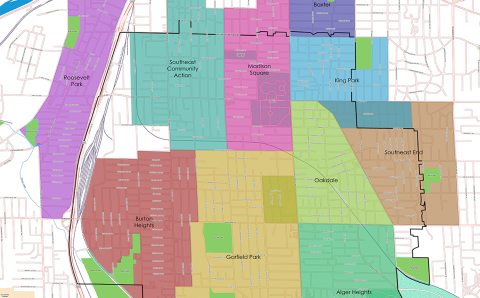Each time Casey drove near the church, she could feel her body involuntarily tense up and her breathing quicken. Fear and rage would course through her veins against her will. Though she hadn’t been to the church in several years, her circle of friends and some family still attended, which made her feel both too close for comfort and unbearably lonely. Three years prior, Casey had been groomed and sexually assaulted by an adult volunteer at her church’s youth group. The horror of the assault shattered Casey’s idyllic world and rattled her to the very core of her being. But the ongoing trauma, confusion, shame, and loss made healing elusive.
Over the years, Casey wondered whether she would ever feel normal again. She wondered when she would be able to drive around town or hang out with friends again without being triggered by a smell, a song, a place. When her night terrors would stop. When her paralyzing bouts of depression would end.
For Casey and others who have experienced sexual, emotional, or spiritual abuse, the harm is life-altering. Depending on the nature of the abuse and the support systems available, it can take every ounce of energy and courage just to navigate the emotional challenges that each new day brings. Often it takes years, even decades, for survivors to find healing and wholeness.
When the one who causes the harm is a member of the church community, the survivor also commonly experiences profound disruption in their faith journey and life with God. The church community that once was a place of love and care becomes a place of fear and danger. The spiritual practices that draw us near to God in times of suffering or grief become, by their association with the abuser, a source of pain and disquietude. And to many survivors, God seems absent and ambivalent to their suffering. The result is that often survivors feel isolated from their church communities, abandoned by God, and disconnected from their faith.
So what is the pathway to healing for Casey and others? What will it take for Casey to feel whole again? To be free of the anxiety, fear, hurt, and self-loathing that eats away at her spirit? To feel safe enough to love and be loved again? And what role can the church and the Christian faith play in her healing?
What the Church Can Do
Every person’s journey toward healing is different. But church communities can have a significant impact on how the trauma from abuse affects a survivor. There is a growing body of research that shows that the impact of a given trauma, even the most egregious violation, is mitigated when a survivor is surrounded by a supportive community. While the impulse of survivors is to withdraw from others in their hurt and shame, survivors need people around them who accept them, who walk alongside them in their pain, and who communicate to them that they are loved and that what happened to them is not their fault. The apostle Paul encourages the Christians of his day to offer this kind of support to each other when he says, “Carry each other’s burdens, and in this way you will fulfill the law of Christ” (Gal. 6:2). By coming alongside survivors in their confusion and grief, church communities ease the load that survivors carry and share in their journey toward healing.
But what does that look like practically? The list that follows is not exhaustive, but it provides some concrete ideas for how to share the burden of a survivor.
- Take a survivor’s testimony of abuse or harm seriously. It takes a great deal of courage for a survivor to come forward with an allegation of abuse. Reporting is emotionally exhausting because it requires the survivor to relive the incident often multiple times to multiple audiences with no assurance that their story will be believed. When a survivor does come forward, then, it is important that the church honor the survivor and the risk they took by following up with some form of investigation and by holding the wrongdoer accountable for their actions if the violation happened at church or by someone who is a member of the congregation. This communicates to the survivor that the church respects them and cares about them and their well-being.
- Assign a support team. Survivors need time to grieve and process their trauma—a task that, especially early in the healing process, can be all-consuming. The church community can support the healing of a survivor by having a couple of people check in with the survivor throughout the week to provide meals or attend to other day-to-day tasks. Providing this kind of practical support ensures that the survivor has the much-needed space to grieve and process their trauma without also having to worry about attending to their physical needs.
- Implement/bolster abuse prevention measures. Those who have experienced abuse in the church need reassurance and evidence that the church is a safe place. When abuse happens in the church, trust in the safety of the community is broken and needs to be reestablished. One way the church does this is by making every effort to prevent abuse. A safe church policy, a code of conduct for ministry leaders and volunteers, and training go a long way toward accomplishing this and communicate to survivors that the church takes seriously its fiduciary and moral responsibility for the safety of its participants.
- Communicate ahead of time what to expect. Survivors are commonly triggered by random things, not all of which can be avoided in church. However, if the worship service or church event includes something unexpected or out of the ordinary (for example, installation of elders and deacons, baptism, communion, or a sermon on an especially violent or troubling text of Scripture), the church may want to inform members of the congregation ahead of time to avoid unnecessary triggering. A simple heads-up in an e-newsletter will suffice to empower survivors to determine whether to join in person or watch the livestream.
These are a few small but impactful things that church communities can do to support someone who is working through the ongoing effects of trauma related to abuse.
But What About Survivors?
Are there any common practices or postures that have helped survivors find emotional and spiritual healing after abuse? Where does a survivor turn when God feels far away and faith no longer feels like a safe or credible source of comfort?
Survivors of abuse are not alone in asking these questions. The people of ancient Israel, for instance, knew what it was like to feel battered and beaten down and even abandoned by God in their hour of need. Throughout the book of Psalms, we have examples of God’s people crying out to God in anger, pain, fear, and doubt and wondering in the midst of it all where God is. “Why, Lord, do you stand far off? Why do you hide yourself in times of trouble?” (Ps. 10:1). “My God, my God, why have you forsaken me? Why are you so far from saving me, so far from my cries of anguish?” (Ps. 22:1).
The emotion in these psalms is palpable. We can feel the psalmists’ profound confusion and hurt. But these psalms are not just attempts to blow off steam. Rather, they are courageous affirmations by the psalmists that they are beloved children of God even in a time when they felt anything but. In these psalms, the psalmists remind God of God’s covenant relationship with them, and they call on God to be God—to attend to their cries and bring justice and healing and wholeness to their shattered selves. For survivors of abuse, the lament psalms are an important resource for processing anger and grief and hurt, and they model how to do this in healthy, productive, and even faith-filled ways. Consider the following features of the lament psalms:
- Honest speech before God. The lament psalms are charged with powerful emotions and unfiltered speech. Truly, nothing seems out of bounds—not even cursing one’s enemies or blaming God for one’s suffering. Honest speech about what is going on in our hearts and minds is an important part of processing our hurt in healthy ways. The psalmists believed the place to go with all that pent-up rage and chaos is God, for God is big enough, and God’s steadfast love for God’s people is strong enough to absorb our pain. For survivors, naming what they are feeling and being honest before God about their anger, their confusion, and their pain is an important and meaningful way to work through what happened to them.
- Your story is yours to tell. In the lament psalms, the psalmists tell God their story: what happened to them, who hurt them, how they were hurt, and what the psalmists want God to do about it. Psalm 55 is an excellent example. One common effect on those who experience abuse is a fracturing of the sense of self and a loss of self-esteem. Narrating the story of what happened to them and the impact on their lives from their own perspective can be an empowering exercise that helps survivors recover their voice and their agency and reclaim control of their story.
- Set healthy boundaries. One way the psalmists protect their emotional boundaries is by naming those who harm them as enemies. In fact, the Hebrew words for “enemy” or “enemies” occur more than 100 times in the psalms. The use of this term isn’t just an exercise in hyperbole. Enemies were named such because they were people who attacked the well-being of the psalmists and compromised their flourishing. Identifying oppressors in this way created much-needed emotional distance between the psalmists and the ones who brought them harm. Survivors similarly need space and time away from the ones who harmed them and anything associated with the violations to allow themselves time to heal and to rediscover who they are outside the context of the harm done to them.
- Surround yourself with people who support you. We tend to think of the psalms as individual prayers prayed when the psalmists were alone. It seems more likely that many of the psalms were prayed in the assembly of God’s people. We get hints of this in Psalm 55:22, when, after pouring out his lament to the Lord, the psalmist addresses those who are gathered around with the words, “Cast your cares on the Lord, and he will sustain you; he will never let the righteous be shaken.” The reality is that the psalmists did not believe they were alone in having to navigate painful experiences. Instead, they relied heavily on their community to share in their burdens, their pain, their grief, and their healing journey. The importance of community and connection in our lives cannot be underestimated, but all the more so when we are suffering. One of the most significant things a survivor can do is allow a community of care—friends, relatives, church members, mentors, and counselors—to support and encourage them in their journey toward healing. It really does take a village.
- Give yourself grace. The lament psalms generally move from lament to praise, mimicking the stages of grief (denial, anger, bargaining, depression, acceptance). But many of them meander a good bit, moving back and forth among the stages. This journey of grief is different for everyone and tends not to follow a predictable path. Things that trigger memories of the abuse can set a survivor back significantly even after long periods of stability or wellness. The unpredictability of dealing with one’s trauma is hard and courageous work. The psalmists’ meandering shows us what it looks like to give oneself time and grace on this journey, trusting that God journeys with us through it all and upholds us in God’s steadfast love.
A couple of months ago, a survivor shared with me how surprised and disappointed she was that a sexual assault five years earlier continued to affect her as much as it did. “Why does this continue to be so hard?” she asked. “I’m a strong, competent, resilient woman. Why can’t I get over this?”
At the time, I simply shared with her words that I have found immensely comforting: God is here. God sees you. God cherishes you. God grieves what was done to you. You are a beloved child of God. And while it may not feel like it, in Christ, God is making all things new. You will be whole again someday.
But I have continued to ponder her question—“Why can’t I get over this?” I think a large part of the answer is that we weren’t made for this. We weren’t made for a world in which we are violated and harmed. We weren’t made for a world of brokenness and sin. As such, we should never hope to get good at getting over oppression and violence and abuse and injustice. To simply “get over” the wrongs done to us is to acclimate to the brokenness and evil of the world and lull ourselves into believing this is OK. The hurt we feel when we are violated or mistreated, then, is not an indication of what’s wrong with us, but an indication of what’s wrong with the world. And this realization should inspire in all of us a deeper longing for Christ and Christ’s kingdom, a world where sexual assault and abuse and injustice will not be tolerated and sorrow and hurt will be no more. Until that day, may we join our hearts with all who groan under the weight of the injustices of this world and pray, “May your kingdom come, O Lord, on earth as it is in heaven.”
Discussion Questions:
- Does your local church have a Safe Church Team that works to help prevent abuse in the church? What steps have been taken in your local church to help prevent abuse?
- Have you ever felt like God is far away or has even abandoned you and therefore is not a source of comfort? How did you cope? How would you help others through these emotions?
- What other ideas or practices can you suggest, in addition to the four listed in the article, that would help a church community come alongside survivors in their journey?
- How do the lament psalms in Scripture help you in your spiritual life?
About the Author
Amanda Benckhuysen is the author of The Gospel According to Eve: A History of Women's Interpretation and Immigrants, the Bible, and You. She works as a safe church consultant for Thrive and attends Kelloggsville (Mich.) Christian Reformed Church.









